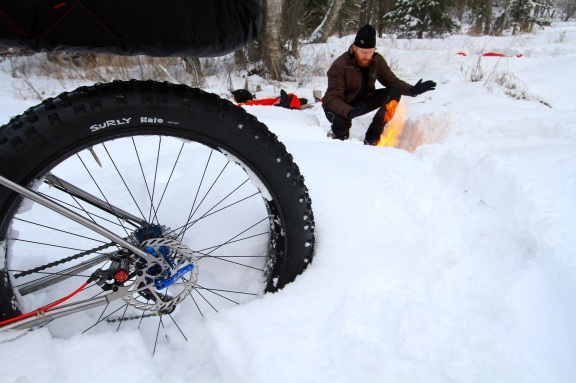
Jason Bratton builds a fire while bike camping in Alaska preparing for the Iditarod Trail Invitational Bike Race. Courtesy photo.
By Howard Meyerson
Jason Bratton and Ted Bentley have a lot in common. Each has an affinity for fat bikes, those heavy, bulbous-tired bicycles for sand and snow. Both love the outdoors, and each loves riding in winter.
But perhaps more significant is the fact they are geeked about winter bike camping and long-distance touring in the extreme.
“I ride in winter more than in summer,” said Bratton, a 38-year-old software tester from Ada, who recently returned from Alaska. He was there to attend a week-long training camp for the 2014 Iditarod Trail Invitational, a 350-mile human-powered race from Knik, Alaska, to McGrath, Alaska, where participants bike, ski or run along a portion of the Iditarod Trail.
“I got interested in winter biking eight years ago. The challenge (at first) was just how to stay warm, seeing the trails in winter and figuring out what the best equipment is. My goal next year is just to finish.”
Bratton will be among those who race the short version of the famous 1,100-mile course to Nome, Alaska, but there are those who will go the distance.
Still, the 350-mile route through arctic snow hardly is a cakewalk. Preparation and training is required to survive and finish.
The 2012 race took almost six days to complete. Four feet of fresh snow slowed everyone down, according to Bratton.
“They say, on average, you will (get off and) push your bike 70 miles” said Bratton, a Rockford native. “Last year, it took two-and-a-half days to go the first 50 miles.”
There are seven checkpoints along the 350-mile course. Competitors can get hot food and or lodging at each, but Bratton plans to camp in the snow using a simple bivy bag instead of a tent to shave setup and take-down time. His nights will be spent in a sleeping bag rated for temperatures as low as 40 degrees below zero. The bivy sack will protect the bag from the elements.
Bratton and Bentley recently took off on a local winter bike packing tour near Greenville,

Ted Bentley prepares a hot drink while on an overnight bike camping trip to prepare for the Arrowhead 135 winter bike race in Minnesota in 2014. Courtesy photo.
part of their preparations for different extreme winter cycling events next year. The cyclists cooked out and slept in the snow and enjoyed themselves immensely.
“This is my first year winter camping,” said Bentley, the service manager for Ada (Bike Shop), in Ada. “It allows me to get out of my comfort zone.”
Bentley plans to compete in the 2014 Arrowhead 135 in Minnesota’s Superior National Forest. The 135-mile event has developed a following among ultra-racers. It drew 135 competitors to International Falls, Minnesota in 2012, where the race begins before heading overland through a rolling and rugged landscape where bitter cold is the norm.
“It takes about 60 hours and one or two nights,” Bentley said. “You have to make two-and-a-half miles per hour to finish in 60 hours. A buddy of mine had to drop out this year. It snowed 10 inches, and he was walking the course. He wasn’t going to make it.”
Bentley began winter cycling in 2000. He switched eventually from a mountain bike to a “fat bike,” which gave him more control in slippery conditions and proved more to his liking.
“Fat bikes allowed me to slow down mentally and get out in the woods and enjoy them a lot more,” said Bentley, a Grand Blanc native who lives in Lowell. “And winter riding wasn’t a big deal to me. I always loved playing out in the snow.”
He and Bratton say the allure of the extreme endeavors ahead is the physical and mental
challenges they will face. Each has grown tired of regional bike races where the course involves “riding in circles.”
“Being up there (on the Iditarod Trail) and riding on a frozen river and seeing dog teams training was really a mind-opening experience,” Bratton said. “I want the challenge.”
“I’ve been following extreme winter cycling for five or six years. It is getting more and more popular.”
Bratton’s stint at the Iditarod Invitational Training Camp made him eligible for an invitation to the race next year, which he expects to receive. Those who aspire to the race must either participate in a qualifying event such as the Arrowhead 135 or pass muster at the training camp.
“I was prepared. My gear checked out,” Bratton said. “But I didn’t have an 800-fill down jacket. I am more of a layering guy, but they said you don’t have time to layer when it’s 40 below zero. You want something you can put on right now.”
__________________________________________
© MLive.com. All rights reserved.
This story appears on MLive Outdoors.


I’m looking at one for the Simpson Desert Bike classic in Australia, 480 kilometres across the desert….
LikeLike